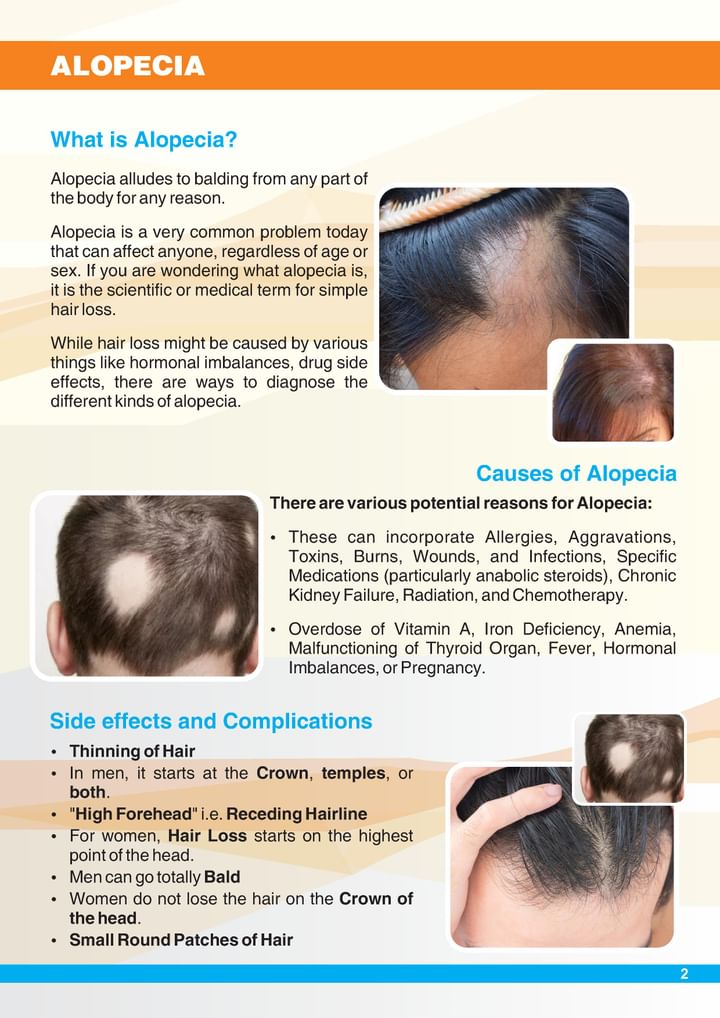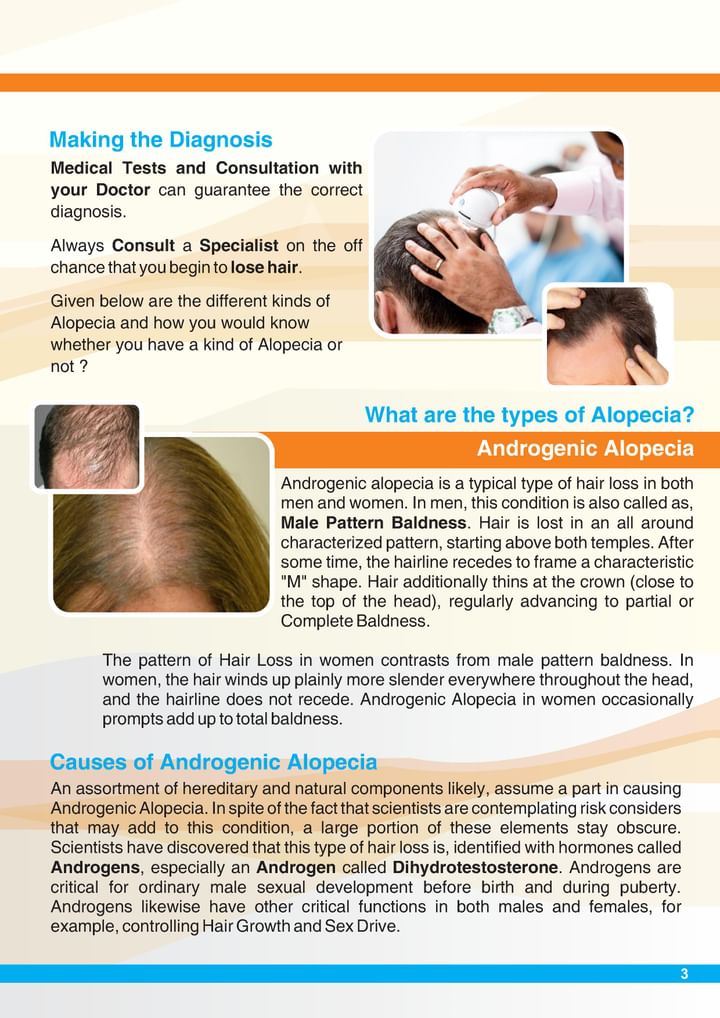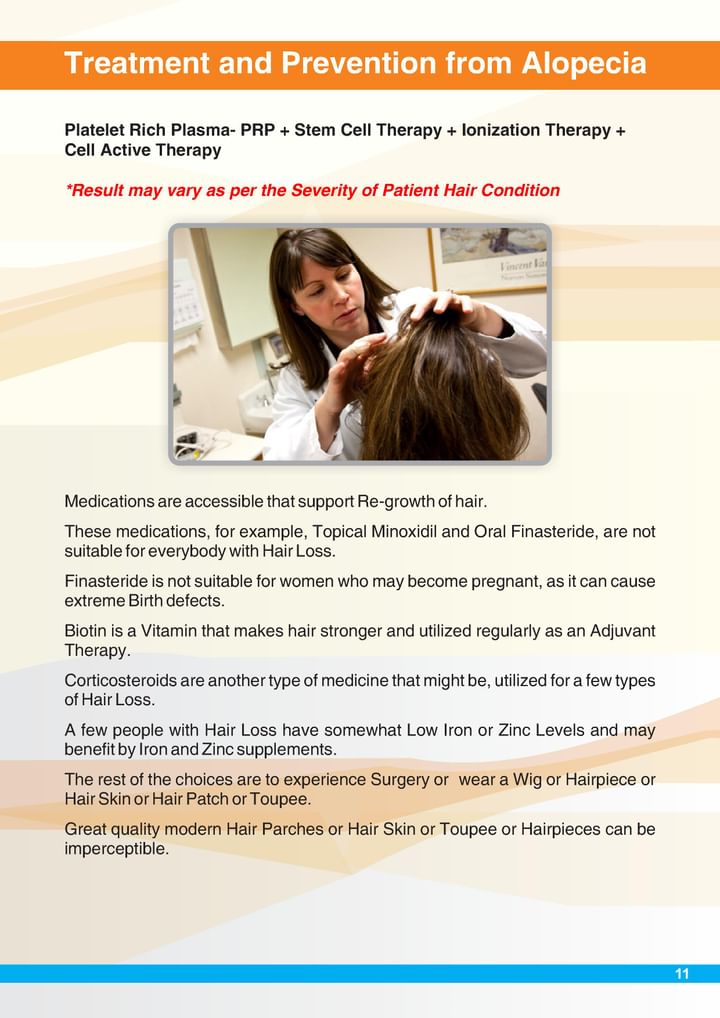What is Alopecia Hair Loss - Types/Causes/Diagnosis and Treatment
Alopecia alludes to balding from any part of the body for any reason. There are a few types, extending from Thinning of Hair to Complete Baldness. Alopecia is, extensively grouped into two classifications. In Non-Scarring Alopecia, the hair follicles are yet alive and hair can be grown. In Scarring Alopecia the hair follicles are decimated and will not re-grow hair.
What are the types of Alopecia?
Many people are at this point are familiar with the term Alopecia, after various reports in the press about Celebrities who are experiencing Hair Loss.
Alopecia is the Latin word for Hair Loss, and the term covers a scope of conditions.
Here we will take a look at the most widely recognized types of Alopecia.
Androgenic Alopecia
Androgenic Alopecia is the logical name for the hereditary hair loss conditions Male Pattern Baldness and Female Pattern Hair Loss. It is the most well known type of hair loss, and influences numerous people eventually in their lives, sometimes as early as the late teens or mid twenties.
The condition is, caused when Enzymes in the body start transforming the hormone testosterone into its subsidiary, Dihydrotestosterone, which has the impact of contracting the hair follicles. An inclination for Androgenetic Alopecia can be gone down through the Genes on either the Paternal or Maternal side.
Click to Read more about Androgenic Alopecia
Alopecia Areata
This is the type of Hair Loss commonly associated with the Term 'Alopecia' in media reports. Alopecia Areata generally introduces itself as Patchy Hair Loss on the Scalp, and is an autoimmune system issue, which makes the body's own Immune System to assault Healthy Hair Follicles. The correct reasons for the condition stay obscure, yet it is broadly, thought to be activated by Stress and Traumatic mishaps.
Now and again, Alopecia Areata can advance to the entire scalp. This is known as, Alopecia Totalis. At its most extraordinary, the Hair Loss can happen over the whole body, including Eyebrows.
Alopecia Universalis (AU) is a condition that causes hair loss.
This type of hair loss is unlike other forms of alopecia. AU causes complete hair loss on your scalp and body. AU is a type of alopecia areata. However, it differs from localized alopecia areata, which causes patches of hair loss, and alopecia totalis, which causes complete hair loss on the scalp only. Little Britain co-creator Matt Lucas experiences this kind of Hair Loss, which is known as Alopecia Universalis.
Ciatricial Alopecia or Scarring Alopecia
Ciatrical Alopecia is, also known as, Scarring Alopecia. The condition Cicatricial Alopecia or Scarring Alopecia is a type of Hair Loss in which hair follicles, are pulverized and replaced by scar tissues.
There are two types of Cicatricial Alopecia
-
Primary Cicatricial Alopecia
-
Secondary Cicatricial Alopecia
Primary Cicatricial Alopecia
Primary Cicatricial Alopecia the hair loss is, caused straightforwardly by irritation of the hair follicles, the reasons for which are minimal understood.
Secondary Cicatricial Alopecia
Secondary Cicatricial Alopecia in the meantime, alludes to Scarring Hair Loss, which happens because of an occasion or process inconsequential to the follicles, for example, Burns or Infections.
Traction Alopecia
Traction Alopecia varies from different types of Alopecia in that it is generally, caused specifically by the activities of the person, which result in unreasonable strain on the hair and breakage. Certain Haircuts, for example, Interlacing and tight Ponytails are normal reasons for Traction Alopecia. It, can be also caused by rehashed treatments with chemicals, for example, Hair Shading and Bleaching.
Causes of Alopecia
There are various potential reasons for Alopecia:
Hair Loss
Temporary or Permanent, it can be activated by any number of variables. These can incorporate allergies, aggravations, toxins, burns, wounds, and infections. We additionally realize that specific medications (particularly anabolic steroids), Chronic Kidney Failure, Radiation, and Chemotherapy can make hair fall. Occasionally, hair loss might be because of a Vitamin A overdose, Iron Deficiency, Anemia, a malfunctioning of thyroid organ, fever, hormonal imbalances, or pregnancy.
Side effects and Complications
Thinning of Hair is the most evident side effect of Androgenic Alopecia. In men, it starts at the crown, temples, or both. They additionally have a tendency to get a 'High Forehead' that is related with a Receding Hairline. For women, Hair Loss starts on the highest point of the head. While men can go totally Bald, women do not more often than not lose all the hair on the crown of the head.
Alopecia Areata shows up as sudden losses of small round patches of hair, normally from the scalp, yet some of the time from the face or body. The fingernails might be daintily hollowed or stippled. The disease often comes in cycles, with Re-Growth in the middle.
Making the Diagnosis
While hair loss can be exceptionally troubling, Alopecia without anyone else is not destructive - the harm is Cosmetic. Yet, there is dependably a shot that Alopecia may be an auxiliary impact or symptom of some different sickness. Undoubtedly, just Medical Tests and Consultation with your Doctor can guarantee the correct diagnosis. Always consult a specialist on the off chance that you begin to lose hair.
Family history will frequently tell the specialist what type of Alopecia an Individual has. Occasionally, a punch biopsy might be important to decide the kind of Hair Loss. Taking a gander at culled hairs under a Microscope can differentiate between Alopecia Areata and Androgenic Alopecia. Different tests; may be done to check for immune system diseases like lupus that can go with Alopecia.
Treatment and Prevention
Platelet Rich Plasma - PRP
Ionization Therapy
Cell Active Therapy
*Result may vary as per the Severity of Patient Hair Condition
- Medications are accessible that support Re-growth of hair.
- These medications, for example, Topical Minoxidil and Oral Finasteride, are not suitable for everybody with Hair Loss.
- Hair Growth medicines work to varying degrees in various individuals, and just trigger complete Re-growth in a minority of people. They work best for individuals who have less Hair Loss.
- Hair Loss returns on the off chance that you quit taking the medication.
- Finasteride is not suitable for women who may become pregnant, as it can cause extreme Birth defects.
- Biotin is a Vitamin that makes hair and nails stronger and utilized regularly as an Adjuvant Therapy.
- Corticosteroids are another type of medicine that might be, utilized for a few types of Hair Loss.
- Less extreme cases of Alopecia Areata, are at times treated with corticosteroids infused into the influenced area. Systemic (Pill Form) Corticosteroids have long haul reactions and reserved for more extreme cases.
- Another treatment for insensitive Alopecia Areata, is to purposely incite an Allergic Reaction Response (Contact Dermatitis) with a Chemical applied to the scalp. A rash creates, and hair frequently grows back in a similar spot a couple of months after the fact. However, it can be awkward.
- A few people with Hair Loss have somewhat Low Iron or Zinc Levels and may benefit by Iron and Zinc supplements.
- On the off chance that there is a systemic ailment prompting hair loss, at that point treating the basic ailment may help in Hair Growth.
- For serious Alopecia of any type, medication may enhance the condition however cannot cure it. The rest of the choices are to experience Surgery or wear a Wig or Hairpiece or Hair Skin or Hair Patch.
- Great quality modern Hair Parches or Hair Skin or Toupee or Hairpieces can be imperceptible.
Also Read: Hair transplant surgical technique can help you regrow your hair. Don't delay consult a hair transplant specialist now.





+1.svg)
